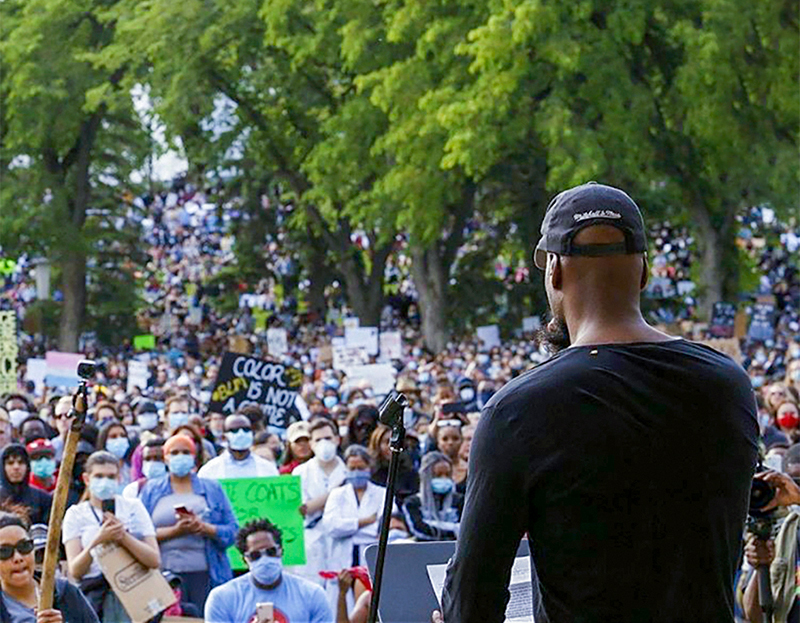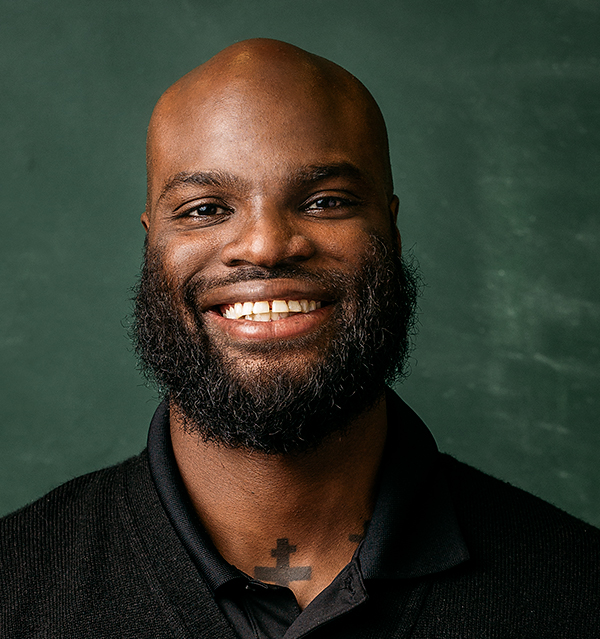Given Parker’s teaching philosophy, it’s probably unsurprising to learn that some former students — now U of A and MacEwan students — are active in the local Black Lives Matter movement. And equally unsurprising that they asked him to speak at a rally at the Alberta legislature June 5 in the wake of the killing of George Floyd in Minneapolis. New Trail got in touch with him to discuss the experience.
Describe the day of the rally. What was it like getting on that stage, in front of a crowd of 15,000?
I know that some people may have been afraid to get on that stage. We live in an era of mass shootings. What if one of those guys was there at the protest and said, “Well, who is this Black guy talking? He doesn’t deserve to talk.” I knew some of these things going into it and I made the decision anyway, because you know, at the end of the day, it’s about the world. The world changed my life that day and I just want to be a part of that team. And I want the team to know that I love them.
I don't remember giving the speech — it just went by that fast. And when it was done, this woman came up to me and said, “I’ve lived in this country for 70 years. I’ve seen so much, gone through so much. And I want you brothers to know that we are fighting with you. And we are by your side.” I kneeled down, and started to cry. “Get up,” she said, and I kissed her on her cheek and then we hugged. And I will never forget that woman, from now ’til the end of my life. The brothers around me were crying too. I never even got her name, but she came to me and she embraced me like a son. I felt like a bridge between generations.
That was a powerful moment. What do you think it meant for your former students to see you on stage?
For them, having me speak, it’s like, “Well, now I know that Mr. Parker wasn’t putting on a show in the classroom.” But these kids need this. My culture needs this. I need this. My mom needs this. Our city needs this to grow and build. And these kids, they sent messages after, saying, “Thank you for being a positive influence.”
My students know what to expect in my classroom. I’ll talk about Islam. I’ll talk about homophobia. I’ll talk about racism, stereotypes. These are difficult conversations. But because I’m Black, because I’m aware of Black Lives Matter, I’m aware of the senseless violence in the United States and across the world, the carding, the racial profiling. I’ve experienced it myself. Some people are uncomfortable with these conversations. I don’t have the privilege of ignoring what’s happening to my community because I know it could happen to me. These conversations are important, but if we don’t have them in the classroom, the kids might not get that.
People are starting to listen. And my whole entire life, I’ve never seen this many people at one point in time listening to each other, and I can feel the change. I can feel the change. It’s on its way and not just for me, or for my older generation. We’re resigned to the fact that some of our grievances may not be heard. But I think for the next generation, they got a clean shot. They got a clean shot at loving each other. Black, white, First Nations, gay, straight, we’ve got a clear shot to love each other.
So what makes you optimistic about this moment?
Well, first and foremost, the University of Alberta’s president coming out and saying Black lives matter is something that I never thought I would see in my life. It made me more proud to be a Golden Bears alumnus than anything I ever did on a basketball court. And I’ve been lucky enough to do some really cool things on a basketball court! But when he said that Black lives matter — and he’s a Caucasian man in a high position, in the school, academia and society — I said, “This is hope,” I said, “this is hope.” And with this hope we can do beautiful things.
I’ve had conversations with colleagues; they’ve called me up and said, what can I do? How can I help across the school district? We just started the Black Teacher’s Association a week ago. We have all these teachers coming to speak and to be heard. With organizations like this, and with social media making it easier for us to connect with people in different provinces and cities, change is on its way.
What are practical steps we can all take to continue building on this momentum of raising awareness and taking action?
Be honest. Be honest in your conversations. Be honest about whether you’ve benefited from white privilege. You have a chance to right the wrongs of previous generations, previous leaders, previous family members. And it all starts with honest conversations. We’ve got a chance to say, “OK, well they did it this way. I’m going to do what I have to do to see the other side. I’m going to listen and see how they’re feeling before I make my decision.” So share our stories, U of A, share our stories MacEwan, share our stories Edmonton Public Schools, share our stories Edmonton Catholic Schools, share our stories Government of Alberta. Once you hear our voices, you’ll find out that we’re not that different. And if that’s the case, then equality shouldn’t even be a question. It should be a right.
What has life been like since the protest?
My life now can never be the same again. It’s been an overwhelming response — on social media and with people reaching out. I’ve gotten dozens of emails from people in the community, not just Black people, but white people trying to get answers, trying to share things, trying to grow. Trying to heal. And in the last three weeks I’ve literally done nothing but healing. It’s been exhausting! But it’s been so worthwhile. And I don’t care, however long it takes. I’m here to help anyone heal. Hopefully they’re here to help us heal, too.


We at New Trail welcome your comments. Robust debate and criticism are encouraged, provided it is respectful. We reserve the right to reject comments, images or links that attack ethnicity, nationality, religion, gender or sexual orientation; that include offensive language, threats, spam; are fraudulent or defamatory; infringe on copyright or trademarks; and that just generally aren’t very nice. Discussion is monitored and violation of these guidelines will result in comments being disabled.